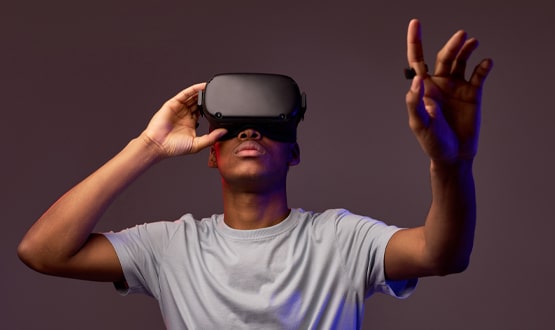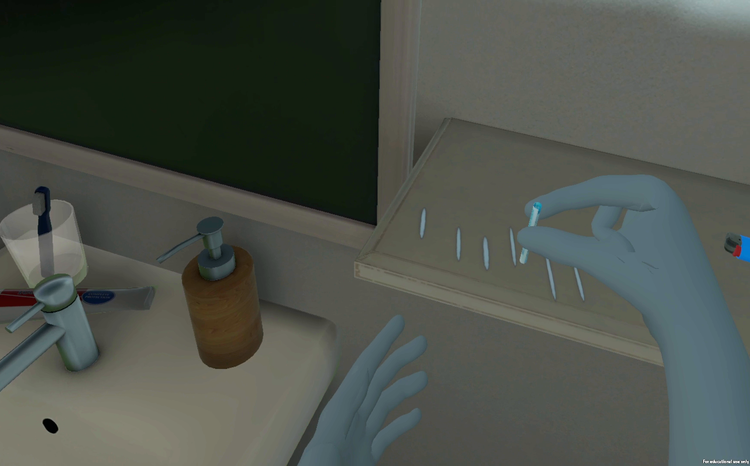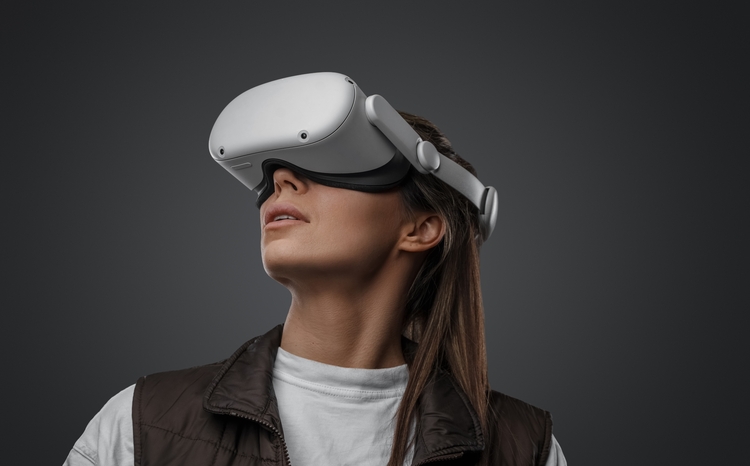Immersive technologies such as virtual reality have the power to improve care and change lives
- 4 April 2023

A ‘practical and sensible approach’ to immersive technologies is delivering significant gains for patients and staff at a major NHS trust in London, reveals digital innovation fellow Tom Carlisle.
The covid-19 pandemic undoubtedly accelerated the use of immersive technologies in healthcare. At Chelsea and Westminster Hospital NHS Foundation Trust we’ve been working with partners and clinicians to identify areas where virtual reality (VR), augmented reality (AR) and mixed reality (MR) will have the best impact on patient outcomes. All of these technologies offer powerful ways to support and engage patients and staff.
We have been embracing the use of VR in particular, taking a practical and sensible approach to ensure it benefits patients and the organisation. In our earlier work, the focus was on virtual reality headsets that immerse the patient in an environment designed to relieve their symptoms. In trials, there were particularly good results in reducing anxiety and pain experienced by children attending A&E, but we also saw an improvement in patients’ sleep quality in the Intensive Care Unit, and positive effects on anxiety, stress and pain in cardiac patients.
Immersive technologies:
- Virtual reality (VR) – fully artificial environment. Provides users with full immersion in a virtual environment
- Augmented reality (AR) – virtual objects overlaid on a real-world environment. Users experience the real world enhanced with digital objects
- Mixed reality (MR) – virtual environment combined with real world. Users interact with both the real world and the virtual environment.
Source: RubyGarage
Education, training, distraction
Today, we are using immersive technologies in a variety of ways, including education, triage and distraction. Microsoft’s HoloLens glasses are in use across our hospitals, enabling medical students to stream remotely into clinics; this has helped take the strain off training resources.
Another application is Kiin, which uses VR in equality, diversity and inclusion training for staff. The VR environment replicates real-life situations from different perspectives, providing an experience that is impossible to replicate in a real-world classroom, textbook or online learning.
Both ideas originated from the CW+ RADICAL funding call (Rapid Adoption Digital Innovation Call), which awarded funding to innovative digital ideas submitted by trust staff.
Early diagnosis
The use of immersive technologies can also help with early diagnosis, which is not only hugely beneficial for patients but can help to free up clinicians’ time. In recent months we have been looking at using the visual element of VR to detect earlier dementia.
We are extending the use of VR as a distraction tool and an alternative to pain relief. For example, Smileyscope headsets are being used to support women who experience loss in the early stages of pregnancy: they can observe a relaxing scene or follow a guided mediation while undergoing a manual vacuum aspiration procedure. This can reduce anxiety.
Smileyscope also features in the evolution of our immersive arts in health project, providing games, educational experiences and relaxing distraction content to calm children before and during medical procedures. Another application broadcasts moving animal footage from organisations including San Diego Zoo and Battersea Dogs and Cats Home to paediatric patients. All of this improves the patient experience and reduces the need for pain relief, which also reduces staff workload.
We are so excited about the future of immersive technologies at our trust and throughout North West London. There is so much potential. We can imagine a world where VR could be used for oncology patients in the Chemotherapy Day Unit as a form of distraction and pain relief. AR could be used to educate patients and provide faster and more effective remote diagnosis. And why not use AR in surgery too?
Through Proximie – a platform that combines AR and AI technology with live video stream, allowing surgeons to virtually interact on procedures remotely – we are already reducing the need for patients in rural locations to travel in to the acute hospital setting. This tech could also improve X-rays, bringing 3D images into the delivery of care and anatomy into real time.
Unique opportunities
Immersive technologies, particularly MR, seem to offer unique opportunities to improve the experience of patients. We have several projects in the early stages of development that seek to explore different applications of MR. For example, as part of our ‘Best for You’ young people’s mental health programme, we are exploring applications for MR screens and projectors in our children’s A&E, by overlaying walls, signs and other fixed elements in the environment with virtual text and images to inform and calm young people while they wait to be assessed.
We are also developing projects in our children’s mental health services and Adult ICU to introduce MR tours of clinical areas that will overlay images and videos of real-world environments with virtual information about equipment, staff and procedures likely to be encountered by new patients. We are partnering with Little Journey, who have shown that these MR tours can reduce anxiety and speed up recovery time in paediatric surgical pathways. Our aim is to replicate these benefits across multiple clinical settings and patient groups.
The tech will keep getting better but its prevalence depends on how well we train people to use it, and its acceptance by patient groups as well as staff and individual patients. We need to get this right. Immersive technologies could be used across many clinical pathways. They have the potential to change lives.
Tom Carlisle, digital innovation fellow at CW+, the charity of Chelsea and Westminster Hospital NHS Foundation Trust.




